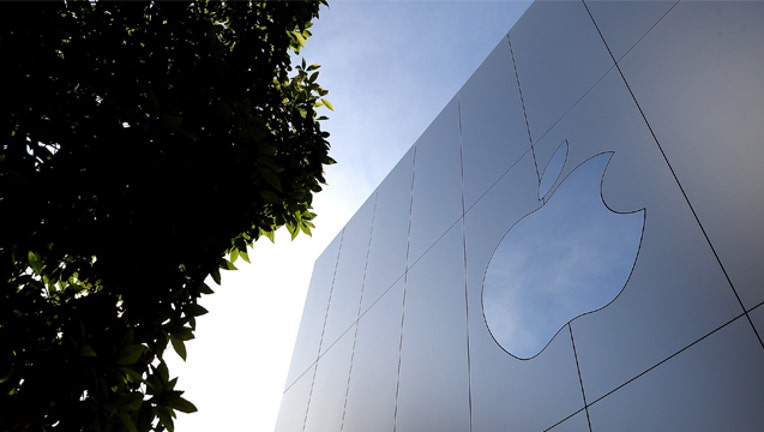Gay-friendly Apple weighs North Carolina despite LGBT laws

SAN FRANCISCO, CA - FEBRUARY 01: The Apple logo is displayed on the exterior of an Apple Store on February 1, 2018 in San Francisco, California. Apple will report quarterly earnings after the closing bell. (Photo by Justin Sullivan/Getty Images)
RALEIGH, N.C. (AP) - Gay-rights advocates are divided on whether to cheer or bemoan a potential marriage between the state of North Carolina and one of the global corporations most friendly to LGBT workers and causes.
Feelings remain raw over North Carolina's so-called bathroom bill, which prompted a boycott campaign. Many advocates remain frustrated that a legislative compromise that put an end to the controversy still allows discrimination against them.
Apple Inc. is close to deciding whether to build a planned corporate hub in the Raleigh-Durham area, a North Carolina government official and an economic development official told The Associated Press. They spoke on condition of anonymity because of confidentiality promises surrounding business recruitment.
The project could create 5,000 North Carolina jobs, with a later target of 10,000 jobs, the economic development official said. And while they denied any direct tie to the Apple decision, top state legislators committed this week to a major expansion of tax breaks for any employers promising thousands of jobs.
An Apple spokesman declined to say Friday how LGBT issues would play into its location decision.
Some activists on lesbian, gay, bisexual, transgender and queer issues think North Carolina remains a bad fit.
"Apple has an opportunity to lead by locating and investing in places that fully protect LGBTQ people. North Carolina is not one of those places," said Kate Oakley of the Human Rights Campaign, the nation's largest LGBT civil rights organization. The group gives Apple its highest corporate equality rating. When CEO Tim Cook came out in 2014, the group praised him as the first openly gay chief executive a Fortune 500 company.
The law North Carolina legislators approved in March 2016, House Bill 2, required transgender people to use restrooms in many public buildings corresponding to the sex on their birth certificates. A replacement law approved a year later did away with that mandate, but says only the state legislature, not local governments, can make future bathroom rules. The replacement law also prohibits local governments from enacting new nondiscrimination ordinances for workplaces, hotels and restaurants until December 2020.
Only Arkansas and Tennessee join North Carolina in expressly forbidding cities from adopting protections for LGBT residents, the Human Rights Campaign said. North Carolina also lacks statewide guarantees against discrimination in employment, housing, education and other arenas, the group said.
Democratic Gov. Roy Cooper "and state legislative leaders doubled down on HB2 last year with an insidious law that prevents LGBTQ people from being protected across the state," Oakley said in an email. "There is no credible path to fixing this problem, and seemingly no political leadership in the state either."
The rewritten law was apparently sufficient for other corporations and organizations that had boycotted the state after HB2's passage.
Credit Suisse specifically delayed adding 1,200 jobs at its North Carolina technology hub until HB2 was at least partially replaced. Sports leagues including the NBA, NCAA and Atlantic Coast Conference decided to hold championship events in North Carolina again after HB2 was replaced.
Despite the lingering questions over discrimination, North Carolina has been considered by site-selection specialists to be a top corporate destination for more than a decade. Since Republicans took control of the state legislature in 2011, they've cut taxes and regulations in an effort to be even more attractive to business.
What lawmakers have done on LGBT issues represents "a state-wide policy that allows each and every business in our state to create HR and other policies that are best for their employees and shareholders," said Tami Fitzgerald, head of the North Carolina Values Coalition, which backed HB2. "The freedoms that North Carolinian businesses and citizens enjoy are clearly attractive to companies like Apple and Google," which have operated server farms in the state for years.
Leaders from Equality North Carolina to Raleigh's LGBT Chamber of Commerce hope Apple's influence would increase pressure to change state laws.
"We see Apple as a top company in our country that has been honestly in the front lines of protecting LGBTQ employees. They have a track record of doing that for decades," said Rev. Jasmine Beach-Ferrara, director of the Campaign for Southern Equality. "As they look at the prospect of locating operations here, our expectation would be that they be as vocal about this issue in North Carolina as they have been in other communities where they've had a footprint."
___
Follow Emery P. Dalesio on Twitter at http://twitter.com/emerydalesio . His work can be found at https://apnews.com/search/emery%20dalesio

